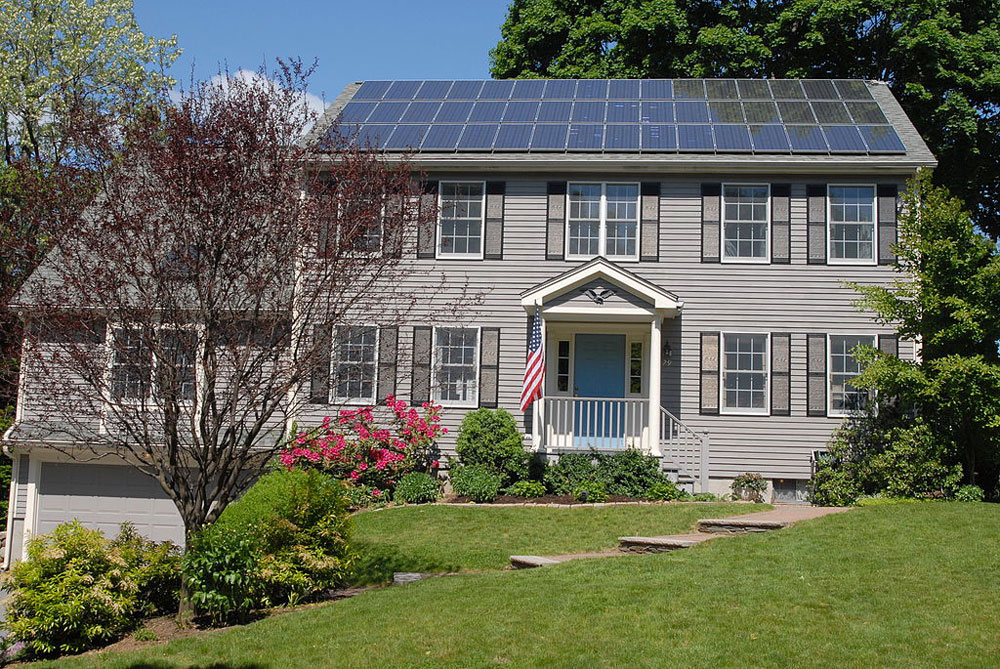
August 7, 2019; Energy News
In 2008, with the Global Warming Solutions Act, Massachusetts set a goal to reduce carbon emissions by 80 percent by 2050. It’s now about a quarter of the way to meeting that goal, but success will require more aggressive action.
Most of the state’s carbon emissions reductions thus far have come from the energy sector. Now, the state is tackling the building sector, with two bills that would double the state’s solar capacity.
“Our building sector is going to be one of the toughest sectors to fully decarbonize,” Deborah Donovan, Massachusetts director for the Acadia Center, an environmental nonprofit, explained to Energy News. “We don’t want to miss any opportunities on buildings we’re going to be living with for the next 50 to 80 years.”
An Act increasing rooftop solar energy (S.1957), filed by Senator Jamie Eldridge, would require rooftop solar installations on all new residential and commercial construction. The bill is based on a similar policy in California and an ordinance that passed in Watertown, MA, last year. Buildings without sufficient sun exposure could apply for exemptions from the requirement. An Act providing solar energy to state agencies (S.1995), filed by Senator Patrick O’Connor, would require solar installations on new and renovated buildings controlled by the Commonwealth. Both bills passed out of the Joint Committee on Telecommunications, Utilities, and Energy in late July and are now being reviewed by the Senate Ways and Means Committee.
Sign up for our free newsletters
Subscribe to NPQ's newsletters to have our top stories delivered directly to your inbox.
By signing up, you agree to our privacy policy and terms of use, and to receive messages from NPQ and our partners.
Ben Hellerstein, State Director of Environment Massachusetts, said in a press statement, “Every day, a clean, renewable, limitless source of energy is shining down on the roofs of our homes and businesses. With this legislation, we can tap into much more of our potential for rooftop solar energy.”
According to the Environment Massachusetts Research and Policy Center, adding rooftop solar to all new homes in the state between 2020 and 2045 would add more than 2300 megawatts of solar capacity, doubling the state’s current capacity and reducing overall carbon emissions by nearly 2 percent.
The real estate and construction industry are opposing the bills, arguing that the solar requirement would increase housing prices, which are already the fourth highest in the country, behind only California, Hawaii, and Washington, DC). But as Hellerstein points out, the cheapest time to install solar is during initial construction. Retrofitting buildings in the future would cost far more.
The solar requirement would also give the solar industry an economic boost. The solar industry employs 10,000 people in Massachusetts, down from 15,000 in 2015. The loss of jobs, experts attribute to uncertainties created by delays in the state’s solar incentive program. Mark Sylvia, president of the Solar Energy Business Association of New England, told Energy News, “This absolutely will continue to support growth in the solar market from a jobs perspective.” Sylvia points out that the industry could ramp up quickly to meet the mandate, since trained technicians are currently underemployed.
Donovan argues that, in the face of the climate crisis, the state can’t afford to wait. “We have to rush to make sure that there are no more buildings built that are going to be using fossil fuels,” she said. “We have to get to that point as quickly as we possibly can.”—Karen Kahn










